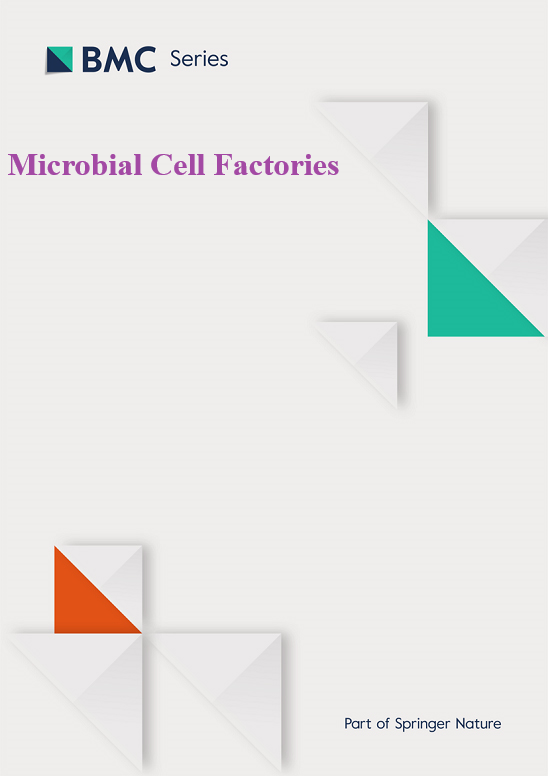Microbial synthesis of sedoheptulose from glucose by metabolically engineered Corynebacterium glutamicum
IF 4.3
2区 生物学
Q1 BIOTECHNOLOGY & APPLIED MICROBIOLOGY
引用次数: 0
Abstract
Seven-carbon sugars, which rarely exist in nature, are the key constitutional unit of septacidin and hygromycin B in bacteria. These sugars exhibit a potential therapeutic effect for hypoglycaemia and cancer and serve as building blocks for the synthesis of C-glycosides and novel antibiotics. However, chemical and enzymatic approaches for the synthesis of seven-carbon sugars have faced challenges, such as complex reaction steps, low overall yields and high-cost feedstock, limiting their industrial-scale production. In this work, we propose a strain engineering approach for synthesising sedoheptulose using glucose as sole feedstock. The gene pfkA encoding 6-phosphofructokinase in Corynebacterium glutamicum was inactivated to direct the carbon flux towards the pentose phosphate pathway in the cellular metabolic network. This genetic modification successfully enabled the synthesis of sedoheptulose from glucose. Additionally, we identified key enzymes responsible for product formation through transcriptome analysis, and their corresponding genes were overexpressed, resulting in a further 20% increase in sedoheptulose production. We achieved a sedoheptulose concentration of 24 g/L with a yield of 0.4 g/g glucose in a 1 L fermenter, marking the highest value up to date. The produced sedoheptulose could further function as feedstock for synthesising structural seven-carbon sugars through coupling with enzymatic isomerisation, epimerisation and reduction reactions.通过代谢工程改造的谷氨酸棒状杆菌从葡萄糖中微生物合成沉庚酮糖
自然界中很少存在的七碳糖是细菌中septacidin和hygromycin B的关键组成单位。这些糖对低血糖症和癌症具有潜在的治疗效果,也是合成 C-糖苷和新型抗生素的基本成分。然而,合成七碳糖的化学和酶法面临着各种挑战,如反应步骤复杂、总体产量低和原料成本高,从而限制了其工业化生产规模。在这项工作中,我们提出了一种以葡萄糖为唯一原料合成色酮糖的菌株工程方法。谷氨酸棒状杆菌(Corynebacterium glutamicum)中编码 6-磷酸果糖激酶(6-phosphofructokinase)的 pfkA 基因被灭活,从而将碳通量导向细胞代谢网络中的磷酸戊糖途径。这种基因改造成功地实现了从葡萄糖合成沉庚酮糖。此外,我们还通过转录组分析确定了负责产物形成的关键酶,并过度表达了其相应的基因,从而使降七聚糖的产量进一步提高了 20%。我们在 1 升发酵罐中获得了 24 克/升的沉淀七聚糖浓度和 0.4 克/克的葡萄糖产量,这是迄今为止的最高值。通过酶促异构化、表聚化和还原反应,生产出的沉庚糖可进一步用作合成七碳结构糖的原料。
本文章由计算机程序翻译,如有差异,请以英文原文为准。
求助全文
约1分钟内获得全文
求助全文
来源期刊

Microbial Cell Factories
工程技术-生物工程与应用微生物
CiteScore
9.30
自引率
4.70%
发文量
235
审稿时长
2.3 months
期刊介绍:
Microbial Cell Factories is an open access peer-reviewed journal that covers any topic related to the development, use and investigation of microbial cells as producers of recombinant proteins and natural products, or as catalyzers of biological transformations of industrial interest. Microbial Cell Factories is the world leading, primary research journal fully focusing on Applied Microbiology.
The journal is divided into the following editorial sections:
-Metabolic engineering
-Synthetic biology
-Whole-cell biocatalysis
-Microbial regulations
-Recombinant protein production/bioprocessing
-Production of natural compounds
-Systems biology of cell factories
-Microbial production processes
-Cell-free systems
 求助内容:
求助内容: 应助结果提醒方式:
应助结果提醒方式:


